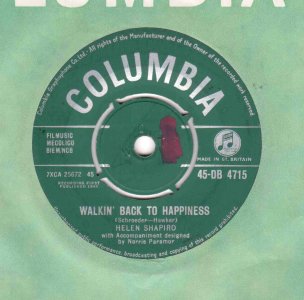| Notes and Quotes: "Walking Back to Happiness" |
|
| One of the most striking aspects of Shapiro's records is her deep voice, which helped to distinguish her from almost all of the other female singers with whom she competed. |
| John Schroeder. Each day went by with nothing worthwhile coming to fruition and I was getting a headache and getting rather fed up. I needed a break and so I went for a walk but before going home that evening decided to have a drink in a local pub. I often get inspiration from studying people, their expressions their movements even their relationships. It didn't matter if I was right or wrong, it was how I musically translated it. On looking around me the entire melodic content of the song suddenly came into my head. I left immediately as I was frightened I was going to forget it! |
| Once on the piano the whole thing fell into place very quickly and very easily but I was really stuck with an idea for the intro. My mind for some reason wandered on to some of the great standards of all time, songs like 'I Get a Kick Out of You' and 'I've Got You under My Skin.' they all had long colle voce [sic. "colla" voce] intros before the main melody came in so I said to myself, 'why don't I write a colle voce intro?' It would certainly be different and it would kick-start the main melody and that is exactly what I did. I then recorded it and sent it to Mike Hawker with an appropriate explanation. I was pretty excited because I felt it was strong and I couldn't wait for Mike's reaction. He must have felt the same because Mike, as brilliant as ever, came back with a simple, catchy, message of love type of lyric with the fabulous title of 'Walking Back to Happiness.' Once again he had hit the nail on the head by coming up with the perfect lyric, to dare I say, the perfect melody! The intro was a dream too--'Funny but it's true what loneliness can do.' |
| Ironically, Mike had developed the title from a bad day at the office. Whilst feeling depressed and walking several miles home to save fare money (we had not as yet received anything financial from our previous success) he remembered that Jean, his by now live-in girl friend was coming back from a concert tour and would be waiting at home. Thankfully for us the combination of actually walking back to something happy provided Mike with the necessary inspiration. |
| It is an interesting fact that 'oop bah oh yea yea' was not initially part of the lyric but envisaged as a musical riff possibly using brass. Mike had indicated this on his copy of the lyric to me by scribbling in something like 'ooh bob bob doodle bah.' / |
| The song was complete and once again I was holding my breath whilst playing it to Norrie and of course anticipating the bloody pregnant pause at the end. It came but this time there was actually some excitement in his voice. |
| 'What rhythm feel do you have in mind? This? or this? or this?' He played three different patters and I endeavoured to demonstrate and verbally describe what I roughly had in my head. |
| I then said, 'I feel there should be something Latin about it. That's what I'm hearing." ... |
| This time Norrie had decided to do the arrangements himself probably because of the importance of Rank but I was thrilled and felt very secure in having his additional input. Helen loved the song and sang it with seemingly such little effort because once again it was tailor made for her. On the routining session Norrie didn't particularly like the idea of the brass riff and suggested it should be replaced with something vocal. Noticing, and bearing in mind what Mike had initially scribbled down, and from the top of my head, I suggested 'ooh bah oh yea yea,' subconsciously remembering 'You don't Know.' Everyone immediately condoned it and it became virtually as strong as the chorus of the song itself, even being taken as part of the chorus itself. (Schroeder 2009, 67-68) |
| Helen Shapiro: I was brought up on blues and jazz and I thought 'Walking Back to Happiness' was corny--all that 'woop-bah-oh-yea-yeah.' I still don't like the song but everyone goes mad for it so I've been proved wrong. That kind of rhythm was not my scene and I didn't really want to do it. (Leigh 1996, 100) |
|
| Schedule |
3 November, 2015
|

